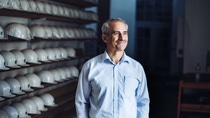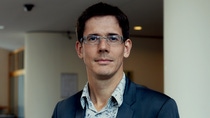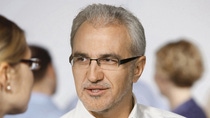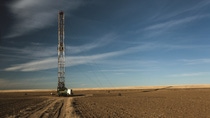News e comunicati
Mohammed M. Amro

Creating Chemistry: Hydraulic fracturing was developed in the US in the 1940s – why has it only now hit the headlines?
Professor Mohammed M. Amro: It has become an increasingly hot topic now because people have become more environmentally conscious. But misconceptions are there because people think we have alternatives, we don’t. Energy consumption worldwide is growing, we expect an increase in demand of at least 3% a year. And the number of conventional reservoirs are depleting slowly, it’s hard to find new conventional reservoirs.
Which risks do you see regarding hydraulic fracturing?
I think one of the risks is the horizontal fracture length. Problems like seismicity and water contamination are associated with this. If we limit fracture length, we could minimize such potential problems. For example, we should not allow a fracture of more than two or three hundred metres, at this stage. Horizontal fracture length can be controlled by the amount of fracture fluid used. So we should regulate the volume allowed for each fracture. Another very important point – we should not frack in a tectonically active region.
You have said that at depths of 1,000 to 4,000 metres fracking can be safe as there is a layer of clay and salt stones that separates the groundwater layer. Why is this?
The deeper you go in the reservoir, the better you can control the fracture pressure – it means you can frack the well or formation more safely. We should avoid reaching up to the cap rock [the rock separating the shale gas formation from groundwater]. However, it is also possible to extract gas from reservoirs that are 1,000 metres deep or less, as long as you limit the fracture length.
You have said that more work needs to be carried out on developing degradable and nontoxic chemicals to use in the process. How could this be done?
This is one of the most important topics we are working on. In Germany, the UK and the US, companies are looking at which chemicals might cause problems for groundwater. Some oil and chemical companies have made progress in developing bio-polymers and starch products that can be used. We are also working on replacing the biocide in hydraulic fracturing fluid [used to eliminate bacteria that produce corrosive by-products]. There is a lot of research on this topic, for example looking into using ultra-violet instead. And efforts are also being made to reduce the number of chemicals used.
“The most important thing is to be transparent, to avoid hiding anything. If we are talking about unconventional reservoirs, we should say so, and not use other words.”
Mohammed M. Amro, Professor and Director of the Institute of Drilling Engineering and Fluid Mining, and Chair of Reservoir Engineering, Production and Storage at the Technical University Bergakademie Freiberg in Germany.
What further research needs to be undertaken into fracking, and are companies and/or governments taking steps to do this?
We can make good progress in developing monitoring methods – this is one area to examine. And we can develop methods for dealing with backflow [wastewater from the well]. Further research is also needed into the high-pressure, high-temperature cement, used to cement spaces behind the casing [a process used to protect groundwater from contamination]. And all staff need to be educated on safety issues around the hydraulic fracturing process.
There are an increasing number of reports on shale gas. Do you think a consensus is being formed, or are opinions diverging?
The problem in our business is that different groups of people – whether they come from a financial, environmental or technical back ground – don’t speak to each other. Each one considers the issues from their own perspective. We should come together to evaluate the topics; we need to create a dialogue between different organisations.
What do you think needs to happen for hydraulic fracturing to become more widely accepted?
The most important thing is to be transparent, to avoid hiding anything. If we are talking about unconventional reservoirs, we should say so, and not use other words. We should have regulations and show them to the public. For example, we should say we will not frack in seismically active areas, before conducting fracturing we will thoroughly investigate formations, we have the tools to monitor the fractures, we will avoid any water contamination. We should explain to the public what we are doing. Regulations should be discussed with the public directly. If any country fails to follow these procedures, we will have trouble everywhere.


